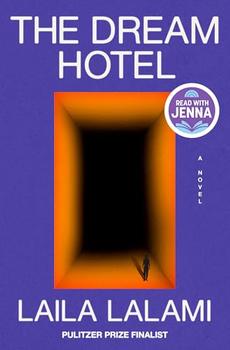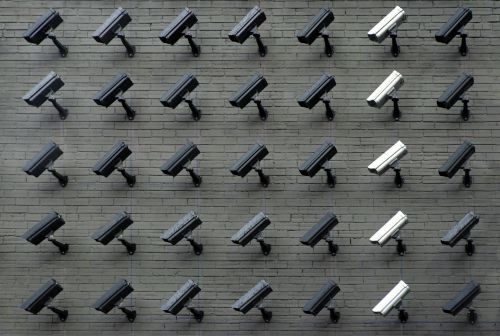Summary | Excerpt | Reviews | Beyond the Book | Read-Alikes | Genres & Themes | Author Bio

A Novel
by Laila LalamiThis article relates to The Dream Hotel
 Laila Lalami's The Dream Hotel takes place in a dystopian future in which government surveillance extends to dreams, and people can be arrested for being deemed a risk to society based on their supposed likelihood of committing a crime. The concept of "pre-crime," or the idea that crimes can be anticipated before they occur, was also famously explored in Philip K. Dick's "The Minority Report."
Laila Lalami's The Dream Hotel takes place in a dystopian future in which government surveillance extends to dreams, and people can be arrested for being deemed a risk to society based on their supposed likelihood of committing a crime. The concept of "pre-crime," or the idea that crimes can be anticipated before they occur, was also famously explored in Philip K. Dick's "The Minority Report."
But while both of these stories are set in a fictional dystopia, Lalami points out in an interview that pre-crime is and has been part of our society for a long time: "When I tell people that I wrote a novel in which algorithmic prediction of crimes plays a central part, they immediately respond, oh, so you're writing a dystopia. But pre-crime isn't fictional, and it's not even in our future, but part of our present and our past. We just don't think of it because it's called something else."
One modern example Lalami gives is "stop and frisk" policies — she specifically mentions the NYPD's policy under Mayor Bloomberg (2002-2013). Stop and frisk refers broadly to police officers stopping and patting down anyone they suspect of a crime, regardless of whether they have "probable cause." Since the landmark 1968 Supreme Court case Terry v. Ohio, where stop and frisk due to "reasonable suspicion" was ruled constitutional, the extent to which it is used has varied from place to place and at times been challenged. The practice is often vehemently criticized on the grounds that it leads to systemic racial profiling and abuses of power. According to Vox, Bloomberg's expansion of stop and frisk in New York did "little to nothing to prevent crime" and during this time over 80% of those stopped — and sometimes subjected to violence — were people of color ("typically young black or Latin men"). This period is known as one of routine abuse and harassment that had lasting harmful effects on minority communities. Some have compared mask bans to stop and frisk laws, as they allow police to stop people at their discretion without a warrant, and to decide if a crime has been committed or if a medical exemption applies.
Another of Lalami's examples of pre-crime is the No Fly List, maintained by the American government's Terrorist Screening Database, which can block people from air travel if the government labels them a terrorist threat. The list has been criticized for racism, unconstitutionality, lack of transparency, and incompetence — a seven-month-old baby once ended up on the No Fly List, and there have been other cases of very young children prevented from boarding planes with their parents. These criticisms converge with recent concerns about United States residents dealing with sudden deportations or detainments while traveling under the Trump administration's expansion of the Department of Homeland Security's (DHS) purview.
While The Dream Hotel focuses on a dream-monitoring implant as the tool of a surveillance state, Lalami says that writing the book helped rid her of some of her fears about technology: "I started to see more clearly the connections between current forms of surveillance and historical ones, and the continued failure of these systems to dim our need for creation and liberation."
Filed under Society and Politics
![]() This article relates to The Dream Hotel.
It first ran in the March 26, 2025
issue of BookBrowse Recommends.
This article relates to The Dream Hotel.
It first ran in the March 26, 2025
issue of BookBrowse Recommends.
Your guide toexceptional books
BookBrowse seeks out and recommends the best in contemporary fiction and nonfiction—books that not only engage and entertain but also deepen our understanding of ourselves and the world around us.